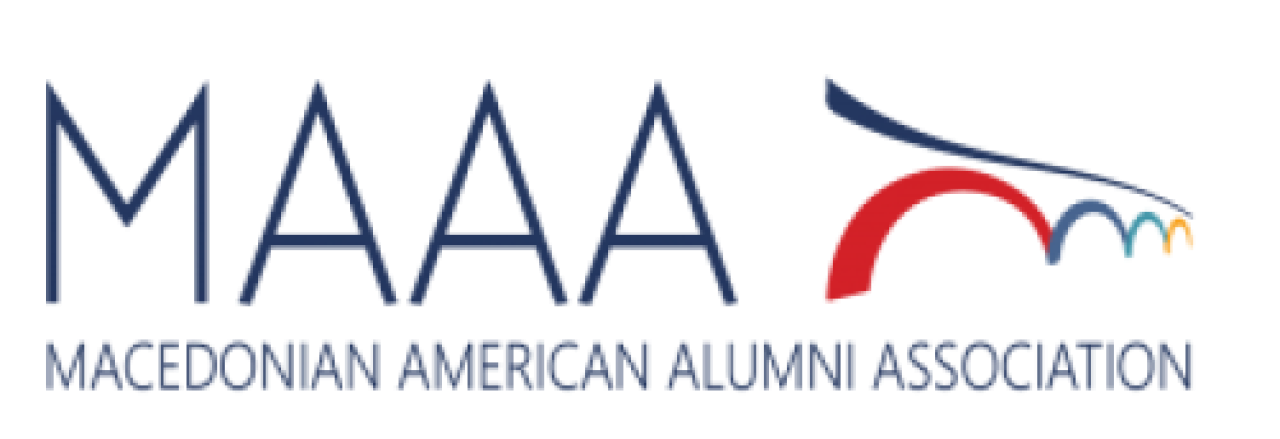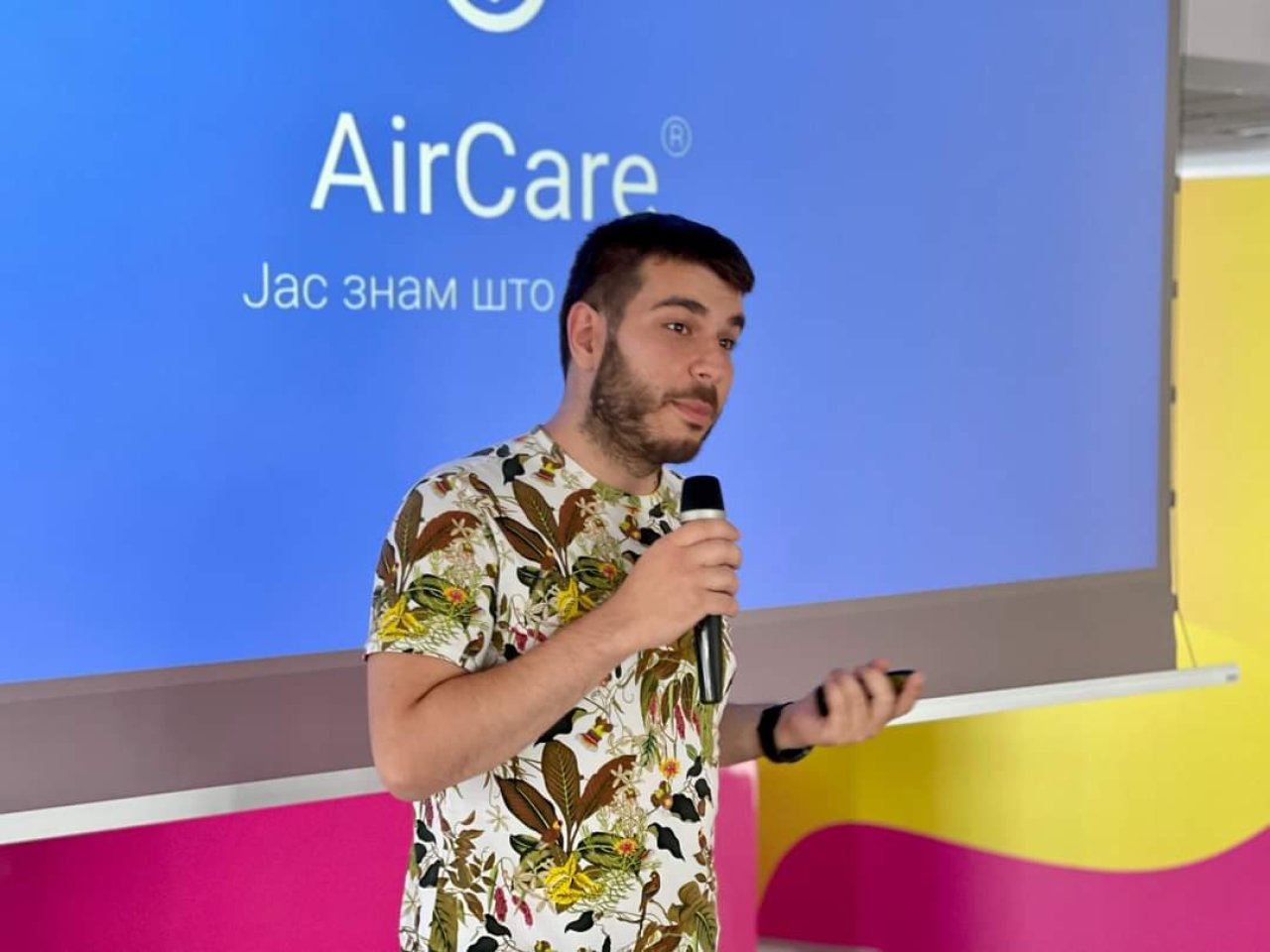

Young People and Activism: INTERVIEW with Gorjan Jovanovski

Gorjan Jovanovski is a Macedonian eco-activist, software engineer and young entrepreneur working on raising awareness about air pollution, urban living and volunteering through technology.
Interviewed by Mira Bekar
Mira (MAAA): Gorjan, thank you very much for accepting to participate in this interview for the MAAA Newsletter. We hope to inform our target audience about the former and current eco-related activities you have been engaged in but also to motivate young people to volunteer and understand better the importance of social change. Could you please first tell us more about all the eco-related activities you have been a part of (as an initiator and as a member). And how did it all start actually?
Gorjan: I’ve been part of many projects or groups; honestly, it’s hard to remember them all. From volunteering in the Skopje ZOO as a high schooler, to teaching the elderly about the internet and email in the Red Cross, to creating AirCare to fight for clean air via technology, all the way to being one of the founding members of the Zelen Human Grad (Green Humane City) coalition which now represents citizens and activists in the Skopje City council.
I actually trace the roots back to 2 main things in my childhood:
1. My parents for one New Year’s party took me to the local orphanage and helped me organize a lottery for the children there, where each of them got a present. My role was to hand them the presents, to learn that New Year is not always about receiving gifts, but also about giving, especially to those less fortunate than us.
2. After a few years, we moved to the US, where I studied in elementary school, and almost every day heard about the importance of preserving nature and living in harmony with it.
Both those things had a lasting impact on my willingness to give back to the community, as well as fight for our environment.
Mira (MAAA): There is a debate about how real social change occurs. Some believe that you can make the change only if you are part of the state institutions/government (change from the inside). Others claim that you should always do an independent fight and oppose state/governmental activities through protests, rallies (change from the outside). What is your insight on this?
Gorjan: The answer is simple: they are both right, in a way that you can only make a change if you have supporters in the 2 parts of the system. With activism, you can reach a wall where no more public pressure can change things. Within the system, you can reach a deaf ear from other groups if no public pressure is happening. When both groups work together, that is how you can change the system, both inside and out. Aren’t the biggest bank heists done with the help from an inside man? :P
Mira (MAAA): Some of the major world events in which young people were involved are the May 1968 protests in France, demonstrations against the Vietnam War, the Civil Rights Movement in the US, the global Occupy movement, the Arab Spring, various Trade Union protests, etc. In N. Macedonia we remember the Studentski Plenum movement (end of 2014) when young generations took an active part in requesting better education and status. Technology has changed the way activism looks. Nowadays, young people would rather raise their voice on social networks than go out on the streets to protest. Actually, research conducted by the firm “Edelman” showed that 70% of Gen Zers are involved in a social or political cause.
I do not say that this method is wrong but is the impact the same? And could you please say more about the online platform Volontiraj.mk in relation to this question?
Gorjan: You know, I am certain technology plays a vital role in activism, especially to young people, but is not limited to just the youth. I mean, without mobile apps, AirCare wouldn’t exist, we wouldn't know what we breathe. But the other side of the coin says that technology can also make us complacent and feel that we've done our part just by posting an angry Facebook post or making a critical tweet.

If we want to make changes to the system or a certain problem, no matter how small, action needs to be on the field as well as online. Sharing is super important to get the message across to as many people as possible, but if there is a protest, you need to show up. If there is a workshop, you need to show up. If there's an election, you need to go out and vote. Simply raising voice online will not lead to major changes in the system, and we need to be aware of that.
That is why I made Volontiraj.mk, an aggregator platform for NGOs and other non-formal organizations in N. Macedonia. The goal was to help people find an organization where they can volunteer their time and effort, for a greater cause. Do you like animals? Trees? Helping the elderly? We have the NGOs for you!
Mira (MAAA): I remember when I and a small group of activists were defending Vodno from destruction for the purposes of setting-up a gas pipeline or when I was involved in the defense of Ilovica (fighting against the gold-copper mine), many citizens from all ages were supporting us online, but rarely who got truly involved. And when asked, people responded that their priority was placed on their private lives and family. It seems like they are not connecting the future happiness and health of their families with the fight for a cleaner environment, but with obtaining more material goods. Or maybe people are disappointed so much that problematic and dangerous issues never get resolved here regardless of the political party in power? What might be the reason for the passivity?
Gorjan: I think that the political parties in N. Macedonia have done a great job inducing apathy and passivity within our citizens. People got used to lies and set the expectations incredibly low, so they can preserve their mental health when they inevitably get disappointed by the next political power. Even during the Colorful Revolution, some of the most prominent activists from the front rows became politicians, got in a position of power, and suddenly turned on their colleagues and started to attack them. This was one of the final stabs at local activism, where people saw a huge movement get destroyed by a political party.
On the other hand, you have so many problems in the society, starting from education to poverty to the health system, and so on. People have so many daily worries on their minds that they simply can't find the mental capacity to start fighting a system so corrupt and so destroyed for years on end.
There is only one way out of this - via a positive example. That was the main reason why I became a local city council member - I wanted to show people that there are still politicians willing to fight for the common good, instead of just looking after their own personal interests, and trying to make as much money and destroy as much of the community as possible during their time in power. That is why I try to attend many meetings and events, talk to many people, and respond online to questions and concerns. We, Zelen Human Grad (ZHG), are the first political group to include the system of direct democracy through technology in the city council, trying to get as many citizens involved in the decision making process, something that has never been done before.
Mira (MAAA): What are the factors or circumstances that give you the power to continue to act (especially against pollution and clean air) even though many of the matters here change very slowly or never change? For me, it was “I have no better choice than using my will and reason for the collective/social good.”
Gorjan: I am a very stubborn person, something that I might have gotten from my father, and that stubbornness helps me in the fight for clean air and for a better community. I refuse to give up my home city and let corrupt, naive, and ultimately bad politicians ruin the place I grew up in and take advantage of my fellow citizens, my friends and my family. The best thing is that I'm not alone! There are so many like-minded people out there. The only point is to have everyone together under one group, or at least under a few groups that can collaborate well and can make a difference. The biggest political parties are huge machineries and have many players in many different levels of society. That is why it’s a long flight, but it's a flight worth fighting and a fight I am committed to.
Mira (MAAA): What do you define as “success” in relation to eco-activism? It seems that the motto “Dream big. Act small” does not work for Gen Z.
Gorjan: Success for me means successfully following positive global trends, implementing them in ways that are not reinventing the wheel, and have measurable outcomes and results that we can say for certain we have done something right and for the good of society. If we can breathe clean air in Skopje 10 years from now, I consider that a massive success.
Mira (MAAA): What advice would you give to our youth and students in regard to their future career plans combined with volunteering and activism plans? In other words, let us encourage young people by explaining to them that being successful, both as a professional in a chosen field and as an activist or a volunteer, brings many personal (mental, spiritual) and collective benefits. In this era of chaos, a clear, brave and decisive action is much needed, if you agree.
Gorjan: There is a big myth that you don't have time to volunteer and be an activist if you have a regular job and social life. I never thought that myself and have proven time and time again that you can do all of this. There are enough hours in the day. All you have to do is look at the screen time on your phone and understand how much time you spend looking at Instagram posts, scrolling through Twitter and liking posts on Facebook. Imagine if you dedicated half of that time to making your community a better place, and everyone did the same thing - we would be light years ahead from where we are now.
Sometimes activism might seem scary. You might worry about repercussions or pressure, but you must understand that the biggest changes are made by brave individuals and groups. You are never alone in your fight. There are always like-minded people around you. All you need to do is find them and organize them together.
Mira (MAAA): Any future plans? Anything to add?
Gorjan: I hope that people start seeing a distinction between the word party, and the word politics. I often hear people being afraid of politics. Yet we truly are afraid of a corrupt political party, not politics -- being afraid of politics is like being afraid of economics or math, they are just simple sciences. We must get involved in politics if we want to see a better world! Everything around us is politics - from the air we breathe, to the water we drink, to the streets, playgrounds, green areas, buildings, etc.
For me, I will continue down the path I took with ZHG, building a bigger and stronger movement to first take back our cities, and then take back our country!